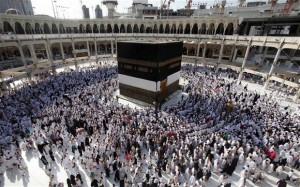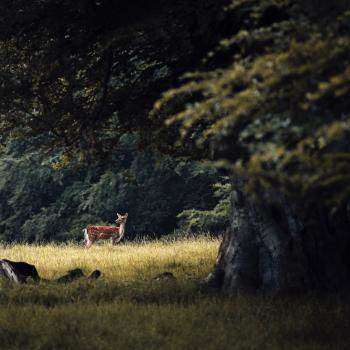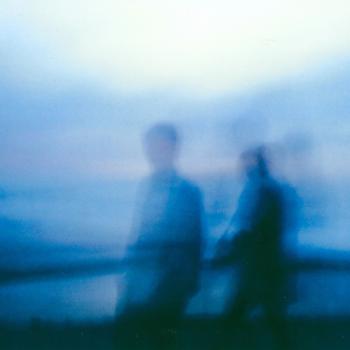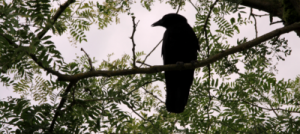Lately, I am drawn more and more to the thought of Carl Jung. I’ve been thinking a good deal about the stages of life (I’m approaching fifty); I’ve been having some pretty vivid dreams. Jung has plenty to say about both these things, and he’s always been especially appealing to me because he was a scientist who endorsed humankind’s need for the spiritual.
This past week, a friend with far more knowledge of Jungian thought than I brought up the fact that Yom Kippur and Eid al-Adha, the Feast of the Sacrifice, will coincide this year—are coinciding as I write this, on October 3.
Eid al-Adha, the Feast of the Sacrifice (not to be confused with Eid al-Fitr, the Feast of the Fast-Breaking, which occurs at the end of Ramadan) is the second-biggest holiday on the Muslim calendar, commemorating Abraham’s willingness to sacrifice his son. It’s a joyous celebration with a great deal of food, music, and family gatherings.
In contrast, Yom Kippur is, of course, the Day of Atonement, a solemn turning inward. While not central to Yom Kippur, the Binding of Isaac, or the akedah, is a vital story in Judaism in much the same way it is in Islam: a symbol of the willingness to martyr oneself for God and to submit completely to God’s will. The Temple Mount, in Jerusalem, is traditionally believed to be the site of the akedah, and the blowing of the shofar is a reminder of the ram who took Isaac’s place once he was spared.
But I hadn’t known, until I began to explore the parallels, that according to mainstream Islamic tradition the Binding—in Arabic, the dhabih—is not of Isaac but of Ishmael, Abraham’s first, illegitimate son. The son isn’t actually named in the Q’uran, and there’s rampant sniping between Jews and Muslims, at least online, about the identity of the sacrificee.
But it makes sense that Islam would make Ishmael the vital participant in this story: he and his mother, the slavewoman Hagar, are at the root of the Muslim family tree, and the Prophet Mohammed is believed to be their direct descendant. Ishmael and Abraham together built the kaaba, in Mecca, which pilgrims circle seven times, in a great sea of humanity, during the hajj.
In my friend’s view, the story—whichever son it involves—is actually the drama of humans moving beyond the need for human sacrifice, a widespread practice at the time of the origins of these stories, and substituting animals. In other words, it’s a story of human progression. These days, I find any notion of progression in human relations comforting. (Although vegetarians might consider further progression necessary; millions of animals are slaughtered worldwide during the two days of Eid al-Adha.)
If we bring the half-brothers back together, the dual/dueling tales of the akedah and the dhabih are also yet another example of individual progression writ large through the personalities of these scriptures—of the dark and the light at odds, the self trying to reconcile with the shadow.
For Jews, Ishmael is the other; for Muslims, Isaac. The Old Testament abounds with stories of brotherly strife: Cain and Abel, Jacob and Esau, Joseph and his brothers who sold him into slavery. In a Jungi-an interpretation these are narratives of the struggle for individuation, bringing together the opposite parts of one’s self to achieve wholeness.
Successful individuation means not isolating or abjuring the shadow but accepting and absorbing it; resisting individuation leads to strife. Jung wrote, “We are convinced that certain people have all the bad qualities we do not know in ourselves or that they practice those vices which could, of course, never be our own.”
We want to resist the shadow self, and we also want to believe in the progression of humankind. It’s tempting to cast not just individuals but entire religions as less evolved. Thus, in Genesis, Ishmael is described as “a wild donkey of a man; his hand will be against everyone and everyone’s hand against him, and he will live in hostility toward all his brothers” (Genesis 16:12). Thus, in Islam, Mohammed is the final prophet, the glorious culmination, superseding Abraham and Jesus.
As a child, I was appalled by the story of Abraham and Isaac. I still think that’s a pretty rational response. What kind of god asks such a thing? In the fundamentalist world of my upbringing, the stories of the Old Testament and this bloodthirsty, sadistic God were presented as fact, but for me this story in particular marked the beginning of skepticism. It could not possibly be true, in the way I was used to thinking of truth.
And that break was the beginning of my understanding that these were tales, myths, although it’s taken me a long time to understand that their power is not thereby reduced, but increased: these are our most basic human dramas, told and retold for thousands of years. They hold truths not about God but about ourselves in relation to our own humanity. In relation to God, if you so believe.
This year, with the coinciding of the holidays (and because of a quirk of the calendar, next year will see the same coincidence), Jews and Muslims living together in Jerusalem must tread even more carefully than usual. For Yom Kippur is a day of contemplation, an introvert’s holiday, whereas Eid al-Adha is a day of exuberance, of music in the streets and bleating car horns. (Although next March, with the feast of Purim, Jews will have their turn.)
In “Psychology and Religion,” Jung wrote, of a mature adult who is conscious of his “shadow”: “Such a man knows that whatever is wrong with the world is in himself, and if he only learns to deal with his own shadow he has done something real for the world. He has succeeded in shouldering at least an infinitesimal part of the gigantic, unsolved social problems of our day.”
As of this writing, police and security forces in Jerusalem are on high alert, but the peace, however fragile, is holding. Thanks be to God.
Holly LeCraw is the author of The Swimming Pool (Doubleday, 2010). She has written for The Millions, Post Road, Writer’s Digest and other publications, and been nominated for a Pushcart Prize. Her next book, The Half Brother, is coming from Doubleday in February of 2015. A native of Atlanta, she now lives outside Boston with her family.












